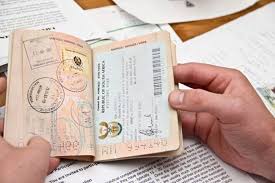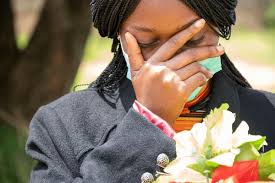Health and Child Care Minister Dr Douglas Mombeshora (left) is shown cholera vaccines donated by UNICEF Health Resilience Fund, by Natpharm pharmacist Memory Mukamuri (right) in Harare yesterday. — Picture: Charles Muchakagara
GOVERNMENT will today receive the third batch of 294 000 oral cholera vaccines (OCV), bringing the total number of vaccine doses available in the country to 892 000.
This comes as Government prepares to begin the rollout of the vaccination campaign in cholera hotspots on Monday.
The OCV campaign is part of the measures being rolled out in response to the current outbreak which has affected more than 20 000 people and claimed 454 lives since its onset in February last year.
Zimbabwe was allocated 2,3 million oral cholera vaccine doses from the international co-ordinating group on vaccine provision and the initial tranche of 892 000 doses is now in place.
Speaking after receiving a consignment of cholera medicines and supplies worth US$265 000 from UNICEF in Harare yesterday, Health and Child Care Minister Dr Douglas Mombeshora said all was set for the rollout of the vaccination campaign.
“We are waiting for the last batch and we are hoping that by tomorrow we will receive the third batch of 294 000 doses to make them 892 000. We should start our vaccination campaign from January 29 up to February 2. But we are expecting 2,3 million doses so we will be vaccinating as they come. The second tranche of another 894 000 doses will be coming and we dispatch it as well until the 2, 3 million doses are completed,” he said.
Dr Mombeshora said the campaign would initially target hotspots, mainly Manicaland, Masvingo, Harare, Mashonaland Central, and Mashonaland West provinces.
He expressed appreciation for the support from UNICEF and other partners in the preparations for the OCV campaign as well as in providing the medication and supplies needed in the fight against cholera.
“What you have given us today is quite substantial and will go a long way in helping us combat the cholera epidemic. As you know, Zimbabwe has had a protracted cholera outbreak since February 2023. This is almost a year now. By 24 January this year, the country had recorded a cumulative number of cases of 20 446 and 452 cholera deaths,” said Dr Mombeshora.
The country’s case fatality rate (CRF) currently stands at 2,2 percent but the World Health Organisation recommends a CFR of less than one percent in a cholera outbreak.
The Minister said the medicines donated by UNICEF would be instrumental in reducing the CFR to acceptable levels.
Among the supplies received by Government yesterday were antibiotics, oral rehydration salts, infusion giving sets, and other commodities used in the treatment of the diarrhoeal disease.
“Amongst the reported cholera cases, 31 percent were under 15 years of age, while 14 percent were children under the age of five. And as we can see today, most of the commodities that we have received will cater for the children, vulnerable people and these commodities will go a long way in reducing the mortality in children,” added Dr Mombeshora.
To date, 60 out of the 63 districts in Zimbabwe have reported cholera cases and the major contributors to the outbreak have been identified as poor water supplies, sanitation, and hygiene.
Part of the measures that have already been implemented include the drilling of additional boreholes, distribution of aqua tablets and water guards in affected communities as well as clean-up campaigns in Harare and Chitungwiza.
In the long term, there are plans to construct more dams around cities, especially Harare, to improve the supply of clean water to the city.
UNICEF country representative Dr Tajudeen Oyewale said the commodities would assist in closing the gap in supplies for the cholera response, improving case management, and reducing the number of lives that might have been lost to cholera.
“UNICEF applauds the Government of Zimbabwe and the Minister of Health and Child Care for the unrelenting efforts to implement the whole of Government and whole of society approach to fight the cholera outbreak. UNICEF will continue to support the Government as we work together with our partners to put an end to this disease, treat infected people, prevent the disease from spreading, and an end to this outbreak,” he said.
Health Resilience Fund co-chair and Ireland Embassy in Zimbabwe programme manager Mr Dumisile Msimanga said US$3 million had been set aside for the cholera response from the US$90 million pooled to fund different health programmes in Zimbabwe over the next three years.
The Health Resilience Fund is a pooled health fund that seeks to contribute towards supporting maternal health, child health, nutrition, and building resilient and sustainable health systems that can withstand shocks. It is funded by the European Union, the Governments of Ireland, the United Kingdom, and Gavi, the Vaccine Alliance while UNICEF, UNFPA, and WHO are the technical partners of the Fund.
Mr Msimanga said the commodities procured were meant to help the Government and people of Zimbabwe respond to the cholera outbreak.
“Feedback from our partners WHO and UNICEF, is that this budget is providing much-needed support in terms of cholera treatment centres, gathering data to guide decision making and working within communities to prevent further spread of the disease. More can still be done to strengthen co-ordination, and we are counting on the Ministry’s leadership in this regard. This will go a long way in improving the allocative efficiency of the limited resources at hand,” he said.
Mr Msimanga said the current cholera outbreak was a reminder of the need for preparedness and strengthening the resilience of the health systems, especially community health.
Source Zimbabwe Situation










